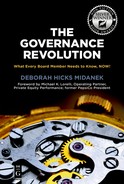Part III: The Role of The Board
Perception of the board’s role has changed quite a bit in last 75 years, and there are many legacies of former conventions clouding today’s boardrooms. Despite improvements in orientation programs, now called onboarding, new directors can easily become disoriented and it is easy for all directors to lose perspective. Functioning of the board can only be as strong as its weakest link, which is often weak due to lack of a clear and common understanding of board role and responsibilities. The debate over the board’s proper role has never been as loud or litigious, though the principles have been in place for over 400 years.
As we marched through those 400 years of history, turmoil, ups and downs and ultimately huge growth, especially following World War II, there were precious few sightings of the board doing its job, and it seems safe to say that the understanding of what that job is has not been broadly understood. These glimpses occurred in response to various kinds of emergencies: getting a bad actor or weak CEO out of the way, serving as proxy for regulators in the ’40 Act, providing defenses to unwanted changes of control, and finally, the spate of corporate disasters that piled up due to perceived governance failures in the early 2000s.
For many, the board’s role tends to be ignored until it is too late for positive outcomes to occur. As a corporate turnaround executive, a great many of the ugly situations I have been called upon to diagnose and try to remedy over the last several decades have been either caused by or made significantly worse by ineffective board leadership.
Why is this? Confusion over role, perhaps the wrong people are seated and not able to stand up and be counted or challenge the CEO . . .head in sand, or up the river in Egypt, which is what is called denial. Sometimes the board lives in its own ivory tower and convinces itself that it is performing well even in the face of many contrary indicators, as boards are still somewhat cloistered, with relatively few inputs from sources other than the CEO, who can if allowed control the information provided.
Some of the worst corporate meltdowns over the past 60 years can be traced in whole or in part to passive directors. Thinking primarily about placating institutional investors, certain stockholders, proxy advisors, and corporate management, these inattentive and deferential board members seem to lack the basic understanding that their role is to care for the enterprise, to be sure their companies can sustain themselves for the long term.
We will take a look at the role of the board and its purpose, both hot topics, as is the very purpose of the corporation. We have seen that the board is a necessary element in the formation of a corporation in every jurisdiction in the world, and, looking at VOC, its use appears to have been inherited from earlier guild structures, rather than intentionally designed to fit corporations per se. We have also seen that corporations and importantly the limited liability they offer investors are devices used to attract and retain capital, and the board comes along as a corollary of the device.
This lack of clarity, based perhaps on the concept discussed above that the construct of the board is an inherited one, has likely been quite useful as it allows broad interpretation of the role. That broad interpretation also contributes to the continuing confusion surrounding the role of the board and its individual members as the blind men keep encountering different parts of the elephant.
In the years following enactment of SOX, getting governance right has become a significant concern not only in the United States but around the world. The question of what corporate governance is and how it should be done is a topic that is no longer obscure. Discussion of it is going on at a feverish pace around the world. From my point of view, I am thrilled as it has been a misunderstood backwater for far too long. When I walked into my first director role in 1990, I struggled to find a book on the subject. Now, governance codes and policies are proliferating exponentially. Too much may be as difficult to make useful, however, as too little. We will move through the various themes to try to distill the simplicity often found on the other side of complexity.
As we collectively confront continuing technological change, cybercrime and cyberterrorism, emerging cryptocurrencies and the possibilities of block chain technology, coordinated international response from corporate as well as government organizations is increasingly crucial. We no longer have the luxury of arguing over the role of the board. Directors and board must understand that the buck stops with the board, and the board is ultimately in charge. Management is an agent of the board.
